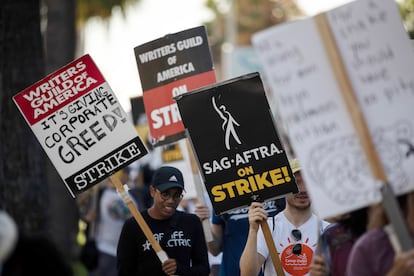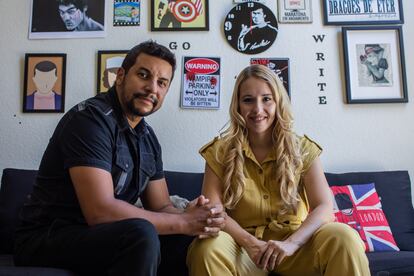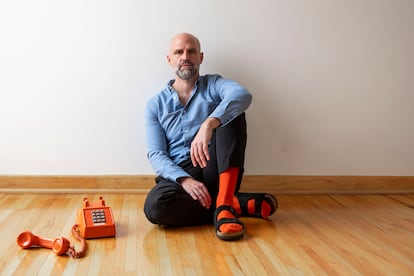The screenwriters’ strike, four months later: ‘It is the hardest moment we’ve had in eight years’
Four Hispanic writers shared their experience with a stoppage that continues to rock the industry — but also their own pockets — as their demands for better conditions remain unmet

“It is the most uncertain moment we have experienced in the eight years we have been here,” says Carolina Munhoz, a screenwriter who is married to another creative, Raphael Draccon. The writers, both Brazilian, say that 2023 began at a very slow pace imposed by the studios. “The industry began to feel the impact long before the strike. Since January, no one has been buying projects and the opportunities to offer projects dried up,” says Draccon.
September 2 marked four months since the Writers Guild of America (WGA)-represented screenwriters went on strike, in a protest that has underscored the labor instability experienced by thousands of people who make a living in this industry. The screenwriters’ battle for improved working conditions and limits on artificial intelligence later extended to actors represented by the Screen Actors Guild-American Federation of Television and Radio Artists (SAG-AFTRA). No end to the strike appears imminent.
Munhoz and Draccon specialize in the fantasy genre and superheroes. But an adverse economic climate marked by industry mergers and cuts led to the cancellation in the first year of an agreement for HBO Max to be the first to evaluate whether to produce their scripts, a type of contract known as a first-look deal.

The couple adapted the series The Chosen One (Netflix) for Brazil, where it became one of the most viewed streaming series. “We have a program that is among the 10 most watched in 60 countries, but we do not receive residuals. This must change,” explain Munhoz and Draccon about one of the points that keep screenwriters and studios without an agreement. Residuals are the payment that creators must receive each time their products are syndicated or sold to a new market. This would force companies to make their content visualization data more transparent, something that the industry is balking at.
“This year has been more precarious for our job security than the coronavirus emergency, and then we were expecting a baby!” they add from their home in Los Angeles. That baby is three years old today. The little girl has accompanied her parents to the picket lines outside the doors of the studios, but she can’t stay for long because she is scared by the passing drivers who honk to show their support for the strike. The decrease in financial resources has forced the couple to cut back on the days that their child goes to daycare.
The couple is at least lucky in that U.S. residency is not an issue for them: Draccon, 42, has just received U.S. citizenship and Munhoz has permanent residency. But this is not the case for many of the people who make up Hollywood’s creative force. Mexico’s Mauricio Katz was forced to return to his country after 11 years in Los Angeles. “The strike came at a time when it involved a lot of sacrifice,” says Katz by phone from Mexico City. The industry stoppage coincided with the expiration of his work visa. Without studios asking him for scripts, he had to put his life in the United States on hold until he is able to renew his working papers.
Katz’s writing was behind the detective series Perry Mason, as well the TV adaptation of Roberto Saviano’s investigation into cocaine trafficking, ZeroZeroZero. The strike put on hold an agreement he had with HBO that included the long-awaited version of The Savage Detectives by Chilean writer Roberto Bolaño. “I already had burnout syndrome before the strike broke out. It’s the first time in a long time that I don’t have a deadline,” he says.

To keep busy, the writer goes to cooking classes twice a week to satisfy another one of his passions, and he is taking a course on Greek tragedies with the poet Luis Felipe Fabre. He is also developing an original script, a personal project that involves “a lot of historical research” that he will try to produce when the industry comes back to life. “Writing is what I find fulfilling and I have to keep doing it,” he says.
In these four months, thousands of professionals have gathered outside studios in LA and New York to demand better compensation and show their rejection of the use of artificial intelligence in the sector. Katz says he went to the first picket lines fearful of a future in which imminent replacement loomed. Then came the important support from the actors, which gave renewed energy to the writers’ union. “I went from experiencing an existential crisis, from fearing that machines would take my place, to feeling more optimistic. Humanity is not replaceable. We will grow as storytellers after this,” he says.
Perhaps only one person in Los Angeles came to demonstrate against corporate greed wearing a T-shirt depicting the most underrated superhero in Latin America. The Mexican screenwriter Gareth Dunnet-Alcocer stood outside the doors of the studios with a T-shirt showing El Chapulín Colorado, the character created by the Mexican comedian Roberto Gómez Bolaño in the 1970s.
This sense of humor has been highlighted by film critics in their reviews of Blue Beetle, the most recent film written by Dunnet-Alcocer. The superhero of the DC universe made its place among the summer releases, grossing $85 million worldwide at the box office. But the premiere left a “bittersweet” taste for this writer, who was born in the Mexican state of Querétaro.

“I missed one of the most important phases of a launch,” says the writer. Members of the WGA cannot attend red-carpet events or promote studio products as long as the strike is still on. This meant that Dunnet-Alcocer had to miss the premiere in his country of a film that focuses on the Latin market. “It was wrong not to have gone, but at the same time it gave me a very deep sense of dignity because we are in the middle of a classic battle between capitalism and humanism, and we have to make it clear that we can coexist,” he says.
The screenwriter arrived in the United States in 2011, but it was not until 2017 that he managed to become a member of the WGA. “Those were years of being screwed very hard, of being paid very little...,” he says. He could not make it on creativity alone. He was also a Lyft and Uber driver, and worked at banquets and liquor stores. The Blue Beetle success has meant that at least for a few months he will not suffer financial hardship, which makes him feel privileged compared to other colleagues who have not had the same luck. “Money was always something that worried me for many years, but now I have a cushion and I have developed a lean-cow-fat-cow mentality,” he says.
“This is a survival strike,” confirms the screenwriter Marisé Samitier, 53, a native of Spain who has been living in the United States for 25 years. She describes this moment as a roller coaster of emotions. But the strike has also evidenced a lot of solidarity among the workers, she adds. “The actors’ strike has given us a lot of support and I have heard that the California economy has lost $2 billion with the protest,” she says. The most recent proposal made by the studios did not convince the WGA. “There will soon be a drought of films, so they will have to get their act together,” says Samitier, who has also directed short films, ads and music videos. She has four feature films written and ready to offer to producers. One of them was going to materialize in the next two years, but the conflict changed those plans. If it goes on too long, notes Samitier, she will have to look for another job.
Sign up for our weekly newsletter to get more English-language news coverage from EL PAÍS USA Edition
Tu suscripción se está usando en otro dispositivo
¿Quieres añadir otro usuario a tu suscripción?
Si continúas leyendo en este dispositivo, no se podrá leer en el otro.
FlechaTu suscripción se está usando en otro dispositivo y solo puedes acceder a EL PAÍS desde un dispositivo a la vez.
Si quieres compartir tu cuenta, cambia tu suscripción a la modalidad Premium, así podrás añadir otro usuario. Cada uno accederá con su propia cuenta de email, lo que os permitirá personalizar vuestra experiencia en EL PAÍS.
¿Tienes una suscripción de empresa? Accede aquí para contratar más cuentas.
En el caso de no saber quién está usando tu cuenta, te recomendamos cambiar tu contraseña aquí.
Si decides continuar compartiendo tu cuenta, este mensaje se mostrará en tu dispositivo y en el de la otra persona que está usando tu cuenta de forma indefinida, afectando a tu experiencia de lectura. Puedes consultar aquí los términos y condiciones de la suscripción digital.








































